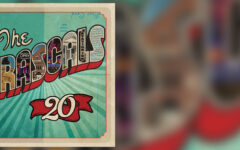
Charlie Treat’s rural upbringing in New England obviously left an indelible impression on him, given his reverence for timeless music gleaned from a traditional tapestry. Treat cites Woody Guthrie, Hank Williams, Bill Monroe, and Flatt & Scruggs as primary influences, and given the rustic arrangements — fueled naturally enough by acoustic guitars, fiddle, mandolin, banjo, and upright bass — it’s clear that Treat is deeply committed to carrying on the sounds of his rural roots.
He’s given ample support in that endeavor on his new project thanks to a band of backing musicians that include Geoff Saunders on upright bass, Oliver Bares Craven on mandolin, Frank Evans on banjo, and Julian Pinelli and Nate Leath, both of whom share fiddle responsibilities. So too, given the fact that Treat penned all the songs, it’s also clear that he’s well in command. Having named the album Into the Wild Mystic Mountain, there’s little doubt about his intentions.
It’s hardly surprising that the album was recorded in a single take. The down-home sounds of Motor Motor, Swimming In November, and Creekwater Blues exude sincerity and eschew pretense, while placing added emphasis on sentiment and simplicity. Treat is clearly inspired by both premise and purpose, and on songs such as Mama Hen and Bluer Than Bluegrass, nostalgia and nuance are imbued with equal emphasis.
Being that Treat’s naturally attuned to conveying songs that ring and resonate with homespun reflection, each of these offerings maintain an unhurried attitude. The wistful reflection of Carrier Pigeon is an ideal example. There are exceptions however. Squirrel Song picks up the pace, while Lorraine adds an extra dose of urgency through its double-time delivery. The jaunty Don’t Tell Me That You Love Me suggests a bit of cynicism, just as Rambler’s First Love conveys some self-doubt.
That said, none of that is enough to detract from Treat’s pervasive appeal. On the contrary, it adds even more. A mere two albums in, he’s already solidified his standing.







